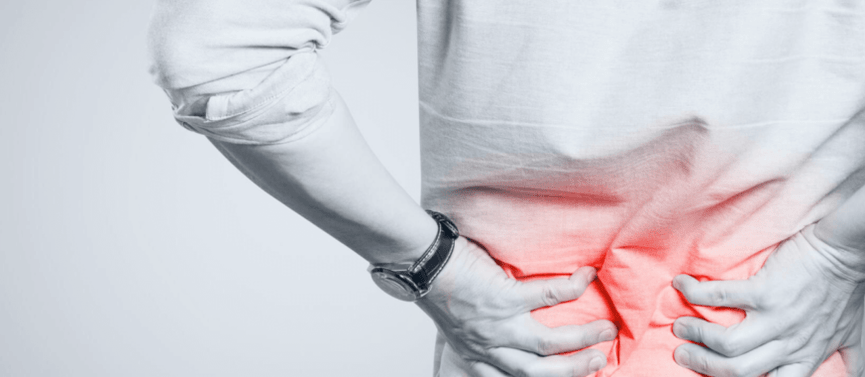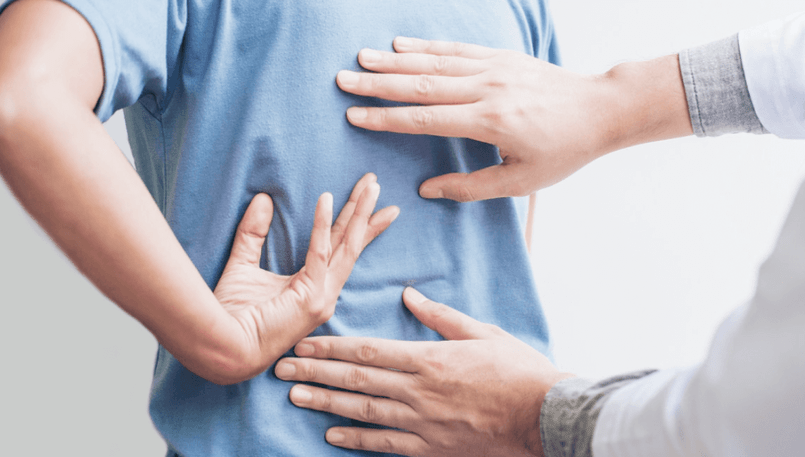Lower back discomfort can occur for a variety of reasons, from muscle damage and back problems to abdominal diseases. If the lower back hurts, you must first understand the reason - only then the pain can be cured quickly and effectively.
Possible Causes of Back Pain
There are several systems in the lumbar region that can cause pain:
Musculoskeletal system.Pain can result from a spinal injury or overexertion and damage to the muscles in the lower back.
Nervous system.The cause of pain can be curvatures, hernias, protrusions, neuropathies, inflammation of the vertebrae and pinched nerves. The nervous system is the most common cause of back pain.
Digestive system.In the lumbar region, pain from the pancreas, stomach, liver, gallbladder and intestines will be given. This is possible with pancreatitis, gastritis, stomach ulcers, poisoning and intoxication, stones in the bile ducts and various forms of obstruction.
Excretory and reproductive systems.Lower back pain can occur with diseases of the kidneys and bladder (renal failure, pyelonephritis, urolithiasis, cystitis), lesions of the uterus and ovaries (cysts, fibroids, inflammation).
Which doctor should you go to if your lower back hurts
By the location of the strongest focus of pain, you can determine where the problem is. But all the organs in the abdominal cavity are very close, so the symptoms are often confused, and pain, especially aching and long, can gird the entire body at the level of the waist and tailbone. So if you don't first carry out a diagnosis, you can start treating a completely wrong disease. And for this you need to contact the right specialist in time.

Traumatologist or surgeon- if you have recently fallen, injured or played intensively.
Neurologist- with acute or shooting pain in the spine, partial loss of sensitivity and mobility, a feeling of creeping on the stomach and legs; if, with prolonged immobility or a change in body position, the pain in the spine increases.
Gastroenterologist- with a long pulling pain, mainly on one side of the lower back; with pain accompanied by digestive disorders; if lower back pain is accompanied by weakness and fever.
Urologist or Nephrologist- with acute pain on one side, as well as with mild aching pain in the lower back against the background of difficult or very frequent urination.
Gynecologist- with pain in the lumbar region on one or both sides, accompanied by weakness and aggravated by movement, against the background of pregnancy or menstruation.
You can postpone a visit to the doctor only if you know why the lower back hurts, and this reason does not cause concern. For example, muscle fatigue from physical work will go away in one to two days without any treatment, and for this you do not need to visit a traumatologist.
Possible diagnosis and treatment
The diagnosis your doctor prescribes depends primarily on your symptoms. First, the doctor will conduct an examination and ask about his health, on the basis of which he will be able to understand the approximate cause of the pain. Then, depending on the symptoms, he will direct you to:
Spine x-ray- with injuries, scoliosis and hernia. Only bone tissue is clearly visible on it, so it will be useless for other diseases.
MRI of the lumbosacral spine- with hernia and protrusion, neuropathy, curvature, trauma, neoplasms. This is a very accurate type of diagnosis that allows you to examine soft tissues at any depth.
CT scan of the lumbar spine- for the same indications, if the patient cannot undergo magnetic resonance imaging.
Ultrasound- if you suspect a disease of the abdominal or pelvic organs. This is a completely safe examination that can be carried out even for children, but not all pathologies can be considered on it.
Gastroscopy and colonoscopy- for diseases of the digestive system. These types of examinations allow you to examine organs and immediately take tissue samples for analysis, if necessary.
MRI of the abdomen and intestines- for a more thorough examination of the internal organs and the circulatory system.
Almost all patients who complain of back pain come with problems of the spine and back muscles. A sedentary lifestyle and heavy lifting lead to constant pain in the lumbar region, regardless of age. Therefore, the diagnosis will begin with an examination of the back and spinal column. Well, if no pathologies are visible on the x-ray, the doctor will refer you for an extended examination of the abdominal organs.

Many diseases that cause lower back pain are treated surgically: hernias, neoplasms, stones in the ducts, pancreatitis. In case of unbearable pain, be sure to ask your doctor what analgesics you can take. Diseases of the spine, if they do not require surgery, are treated with anti-inflammatory drugs, physiotherapy, exercise therapy, a balanced diet, chondroprotectors and lifestyle changes. In each case, everything is individual, so let the doctor prescribe the treatment.
How to avoid lower back pain?
A healthy lifestyle and moderate, constant movement will keep your back healthy for years to come. Monitor your posture, arrange a comfortable place to sleep. If you have a sedentary job, get up regularly and warm up. And if you do not want to play sports, then just include walking in your mode: for example, to work or from the store.
To avoid diseases of the internal organs, you should also monitor your diet and give up bad habits. This is especially true for those who have already been diagnosed with diseases of the stomach, liver, kidneys and pancreas. It is also necessary to monitor clothing so that the body in the lumbar region and small pelvis is always warm. Too cold air can lead to both inflammation of the nerves and diseases of internal organs.
When lifting weights, keep your back straight and lift with your legs. This will shift the load without damaging your lower back muscles. And, most importantly, do not ignore mild pain if it started for no apparent reason. It is better to visit a doctor and make sure you are in excellent health than to skip the onset of the disease when it was easiest to cure it.
















































